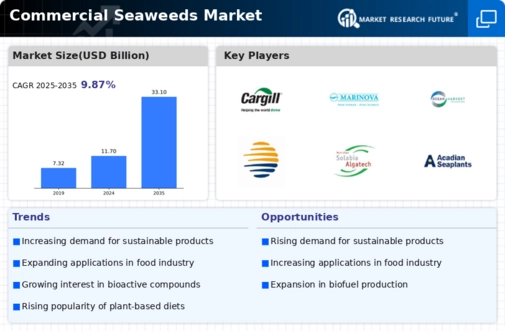Top Industry Leaders in the Commercial Seaweeds Market

Commercial Seaweed Market
The competitive landscape of the commercial seaweed market is dynamic and evolving, driven by the increasing demand for seaweed-based products across various industries such as food, pharmaceuticals, and agriculture. Key players in this market have been strategically positioning themselves to capitalize on the growing interest in seaweed-derived products, focusing on innovation, sustainability, and expansion.
Key Players in the Global Commercial Seaweeds Market
- Cargill, Incorporated (US)
- DowDuPont Inc. (US)
- Algaia SA (France)
- Compañía Española de Algas Marinas S.A. (Spain)
- Extractos Naturales Gelymar S.A.(Chile)
- Acadian Seaplants Limited (Canada)
- CP Kelco U.S., Inc. (US)
- Biostadt India Limited (India)
- COMPO EXPERT GmbH (Germany)
- Compagnie Financiere et de Participations Roullier S.A. (France)
Strategies adopted by these key players include mergers and acquisitions, partnerships, and product innovations.
Mergers and acquisitions have been a common trend in the commercial seaweed market as companies seek to consolidate their market share and gain a competitive edge. For example, in recent years, CP Kelco acquired Cargill's carrageenan business, strengthening its position in the hydrocolloids market. Partnerships and collaborations have also played a crucial role, with companies joining forces to leverage each other's expertise and resources in seaweed cultivation, processing, and distribution.
Product innovation is another key strategy employed by market leaders to differentiate themselves and cater to changing consumer preferences. Seaweed-based snacks, plant-based meat alternatives, and bio-stimulants for agriculture are some of the innovative products that have emerged, driving the market forward. Companies are investing heavily in research and development to explore new applications of seaweed, such as biofuel production and pharmaceuticals, further expanding the market potential.
Factors for market share analysis in the commercial seaweed market include product portfolio, distribution network, research and development capabilities, and sustainability initiatives.
Companies with a diverse range of seaweed-derived products and a well-established distribution network are better positioned to capture a larger market share. Research and development capabilities are crucial for staying ahead in this competitive landscape, as constant innovation is essential to meet the evolving demands of consumers and industries. Sustainability initiatives, such as environmentally friendly cultivation practices and transparent supply chains, are increasingly becoming factors that influence consumer choices and impact market share.
In addition to established players, new and emerging companies are entering the commercial seaweed market, bringing fresh perspectives and innovative approaches. These companies often focus on niche markets or specific seaweed varieties, aiming to carve out a unique position in the industry. For example, Mara Seaweed, a Scottish company, has gained attention for its premium seaweed products and sustainable harvesting methods. As the market continues to grow, these new entrants contribute to the overall diversity and competitiveness of the industry.
Industry news : in the commercial seaweed market highlights ongoing developments, regulatory changes, and market trends that impact key players. For instance, advancements in seaweed cultivation technologies, such as offshore farming and integrated multi-trophic aquaculture, have the potential to enhance efficiency and sustainability. Regulatory frameworks related to seaweed harvesting and processing practices also influence market dynamics, shaping the strategies adopted by companies to comply with evolving standards. Market trends, such as the rising popularity of seaweed as a superfood and increased awareness of its nutritional benefits, further impact the competitive landscape.
Current company investment trends reflect the industry's focus on sustainability, technological innovation, and market expansion. Investments in sustainable seaweed cultivation practices, including land-based and offshore farming, aim to address environmental concerns and ensure a long-term, reliable supply of seaweed. Technological innovations, such as precision farming and advanced processing methods, receive significant investments to enhance efficiency and product quality. Companies are also investing in market research and expansion strategies to tap into new geographic regions and consumer segments.
The overall competitive scenario in the commercial seaweed market is characterized by a balance between established players, new entrants, and innovative startups. Market leaders continue to invest in strengthening their market position through strategic initiatives, while new entrants bring agility and novel ideas. Sustainability, innovation, and diversification are key drivers shaping the future of the commercial seaweed market, as companies navigate a landscape driven by consumer preferences, regulatory dynamics, and technological advancements. As the industry continues to evolve, collaboration and competition will remain essential elements for success in the global commercial seaweed market.
Recent Development :
In July 2019, Univar Solutions, a worldwide distributor of chemicals and ingredients, revealed a partnership with Seaweed & Co., a company based in Scotland. This collaboration was established to broaden Univar Solutions' product portfolio by incorporating innovative seaweed ingredients that cater to contemporary consumer preferences for health, flavor, and sustainability.
In November 2019, Nippon Steel Corporation joined forces with the Furuu District Fisheries Cooperative Association to introduce a pioneering seaweed regeneration project, with the primary goal of fostering the fisheries industry in Japan.










